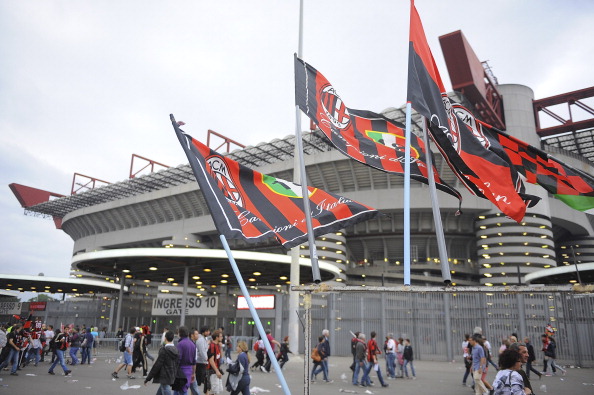By David Gold
August 3 – AC Milan vice-president Adriano Galliani (pictured) has warned that Italian clubs need to renovate or build new stadiums to avoid falling behind France in UEFA’s coefficient rankings, after having dropped below Germany’s Bundesliga last season.
Now in fourth place in the rankings, Italy’s Serie A will offer just three Champions League places this term, whilst Germany has four, despite Italy topping the rankings at the turn of the millennium.
France are now five UEFA coefficient points behind Italy in the rankings, with Portugal a further point back.
But the coefficients are based on a rolling five year period, and next season’s rankings will not include results from the 2007-8 season, in which Italian clubs performed considerably better than their French counterparts, meaning that if the French teams in Europe advance further than Italians, they could climb to fourth place.
The risk of that happening was exacerbated last night when Città di Palermo were beaten in a preliminary round of qualifying for the Europa League by Swiss minnows FC Thun.
Italian teams have advanced beyond the quarterfinals of the Champions League just once in the last four years, when Inter Milan won the competition in 2010, and last year they failed to retain their trophy after being thrashed by German side Schalke 04, who only narrowly avoided relegation from the Bundesliga.
“Soon, thanks to the new stadiums being built for Euro 2016, the French will also overtake us,” Galliani told Italian newspaper Gazzetta dello Sport.
“We could be competitive with equal factors and situations but unfortunately that’s not the case.
“Spain has the advantage that they don’t have collective TV rights, Germany have overtaken us thanks to the wonderful new stadiums they built for the World Cup [in 2006].
“It’s like theatres and restaurants.
“There are beautiful theatres and ugly ones, there are luxury restaurants and pizzerias.
“But we can’t do anything, without stadiums we can’t do anything and without a new law we can’t construct new stadiums.
“Even the politicians have understood that but the design of the law has remained blocked between the two branches of parliament.
“We’ve become outsiders but there are always surprises, there was Schalke in the middle of the richest clubs [last year in the semi-finals].
“And I hope that the next surprise will be Milan.”

AC Milan’s stadium, which they share with Inter, is owned by the municipality of Milan, whilst AS Roma and Lazio share the Stadio Olimpico in Rome, which is owned by the Italian National Olympic Committee.
Juventus, Italy’s most successful club, have been playing in the Stadio Olimpico di Torino after it was converted into a football ground following Turin’s hosting of the 2006 Winter Olympic and Paralympic Games.
From this season though, the Turin outfit will be playing in a new ground being built on the site of their old Stadio delle Alpi, which they will own outright.
That most Italian teams don’t own their own stadiums is a major obstacle to generating income, with gate receipts the main driver of most major clubs’ revenue.
Italian teams have been forced to build up huge debts in an attempt to remain competitive, with rich owners such as the Moratti family who own Inter Milan paying huge sums for transfers and wages, but the introduction of the UEFA financial fair play rules, which mean teams must balance their budgets over rolling three-year periods, will restrict this.
With the Italian economy struggling and Italy’s stock index falling to its lowest level in 27 months, the problem has been exacerbated further leading to a shortage of possible investors willing to buy some of the country’s crippling debts.
Galliano’s words followed those of Cesena owner Igor Campedelli, who said Italian teams will continue to languish behind their rivals, particularly in Spain and England, until they are able to build and own new stadia.
“The most important thing for developing the clubs in Italy is that we have our own stadiums,” Campedelli said.
“Like everyone else in Italy, Cesena uses a public stadium, Juventus are the ones who have their own.”
By contrast, many German clubs benefited from their hosting of the 2006 World Cup, as major stadiums were built across the country, which enabled their clubs to increase their revenue and consequently their performance in European competition.
Italy’s failed bids to host the 2012 or 2016 European Championships could have led to significant investment in stadia, but in the absence of such changes, it is down to the clubs themselves to find the money to invest in new grounds in a bid to remain competitive in Europe.
Contact the writer of this story at zib.l1751413940labto1751413940ofdlr1751413940owedi1751413940sni@d1751413940log.d1751413940ivad1751413940

